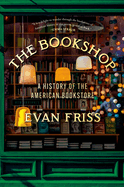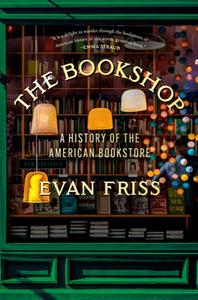
 "Bookstores, even the little ones, can shape the world around them. They already have," writes Evan Friss in The Bookshop: A History of the American Bookstore, a fantastic journey that delves into the impact of independent bookshops on the social and cultural fabric of the United States. And they are bookshops, as Friss points out, not bookstores--venues that navigate a careful balance between community and commercial spaces. The Bookshop traces these places, from Benjamin Franklin's existence as a "shopkeeper who sold books," whose efforts "can be viewed as attempts to unite the colonies through knowledge," through Boston's Old Corner in the 1800s and its introduction of browsing into bookshop culture, and all the way up to the modern day and the people who fight to keep these places open.
"Bookstores, even the little ones, can shape the world around them. They already have," writes Evan Friss in The Bookshop: A History of the American Bookstore, a fantastic journey that delves into the impact of independent bookshops on the social and cultural fabric of the United States. And they are bookshops, as Friss points out, not bookstores--venues that navigate a careful balance between community and commercial spaces. The Bookshop traces these places, from Benjamin Franklin's existence as a "shopkeeper who sold books," whose efforts "can be viewed as attempts to unite the colonies through knowledge," through Boston's Old Corner in the 1800s and its introduction of browsing into bookshop culture, and all the way up to the modern day and the people who fight to keep these places open.
Bookshops have always been under threats--commercial and existential--that have included public libraries, radio, movies, television, mass-market paperbacks, superstores, e-books, and Amazon. Friss likens them to "endangered species," with only 5,591 independent bookshops in the nation, or one for every 59,283 people in 2021, down from 13,499 bookshops in 1993. But they have also adapted to times and political climates, uniting communities across geographies, and shaping societies around them, through revolution, abolition, Pride, and the Black Lives Matter movement. Friss explores not only historical moments in the rise of the bookshop, but also significant bookshops that have become communities unto themselves. He writes about how shops became both refuges and organizing spaces, how subcultures both found a center around which to meet and became targeted through these spaces. He also illustrates how bookshops supported and directed publishing markets through the establishment of publisher fairs and how Frances Steloff of NYC's Gotham Book Mart created the Writers' Emergency Fund, versions of which still provide needed aid today.
Friss (On Bicycles: A 200-Year History of Cycling in New York City) reminds readers that above everything, people go to bookshops because they "often just want company," and that these hybrid "literary playgrounds and capitalist enterprises" are also "critical sites for intellectual, social, political, and cultural exchange" that "nurture existing communities and foster new ones." The Bookshop argues persuasively that not only are these institutions a crucial part of U.S. social and political history, but that they are also worth fighting for in the face of a new generation of technological and financial threats. Be sure to find a copy through your local independent bookshop. --Michelle Anya Anjirbag, freelance reviewer
Shelf Talker: Evan Friss's history of independent bookshops reminds bibliophiles why these spaces are the ideal places to get lost and escape reality.

